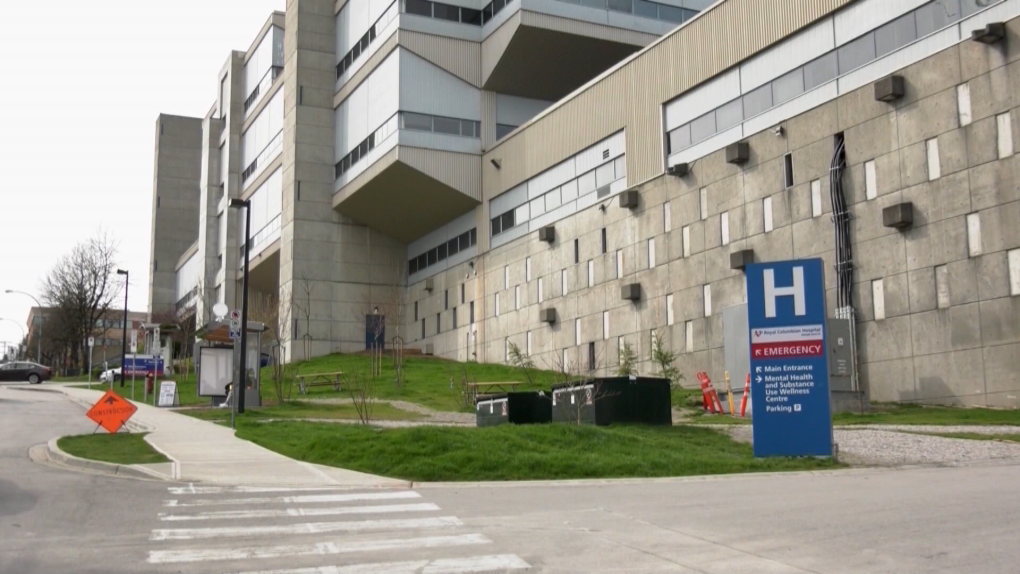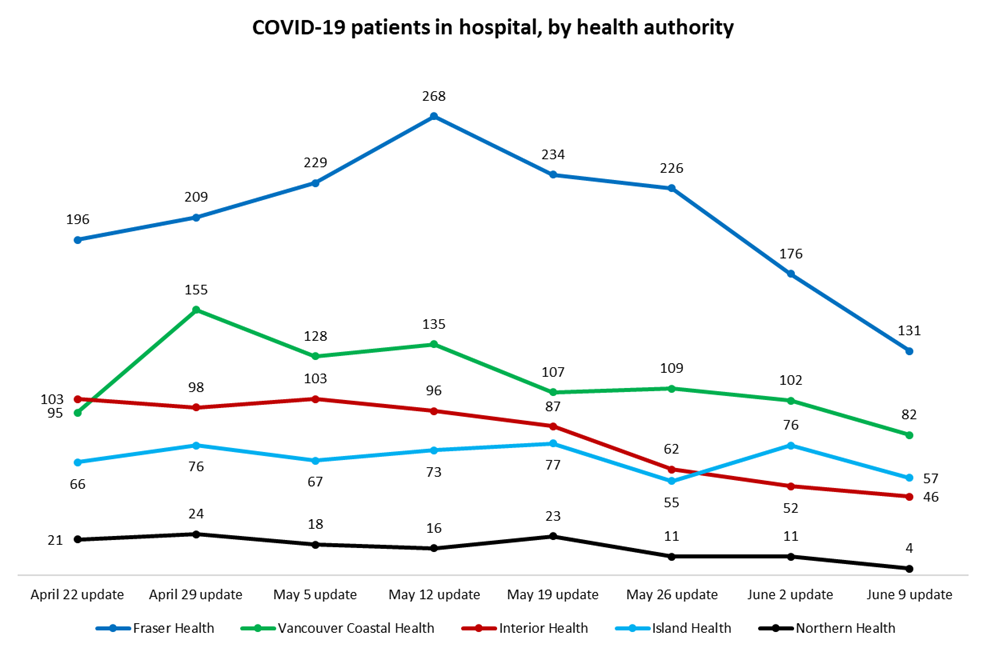Every region of B.C. saw its number of people hospitalized with COVID-19 decline this week

The number of COVID-19-positive patients in B.C. hospitals declined significantly this week, and for the first time in months, every regional health authority also saw its hospital census decrease.
There were 96 fewer patients in hospital with the coronavirus on Thursday than there were the previous week, according to the B.C. Centre for Disease Control. And nearly half of that decline came in the Fraser Health region.
 The graph shows the number of test-positive COVID-19 patients in hospitals in each of B.C.'s regional health authorities on Thursdays since mid-April. (CTV)
The graph shows the number of test-positive COVID-19 patients in hospitals in each of B.C.'s regional health authorities on Thursdays since mid-April. (CTV)
Fraser Health saw its hospital census decline by 45, from 176 last week to 131 this week. It's the only regional health authority with more than 100 test-positive patients still hospitalized.
Vancouver Coastal Health's patient total dropped by 20 (from 102 to 82) and Island Health's dropped by 19 (from 76 to 57).
Interior Health saw the smallest decline, with six fewer patients this week (46) than last (52), while Northern Health saw seven fewer patients, bringing its total down to just four.
The regional totals don't add up to the overall total of 325 because COVID-19 patients in Provincial Health Services Authority facilities are not reported by region on the BCCDC's COVID-19 dashboard. The regional totals add up to 320, implying that there were five COVID-19 patients in PHSA facilities as of Thursday.
Hospitalization figures in B.C. include both people who are admitted to hospital because of serious illness from COVID-19 and those who are hospitalized for other reasons and test positive incidentally.
Since the province began counting hospitalizations this way – rather than attempting to sort out and report only those hospitalizations that were actually caused by COVID-19 – there have been as many as 985 patients in hospital on a Thursday, province-wide, and as few as 255.
The new hospitalization numbers reported Thursday came alongside a decline in lab-confirmed cases of the coronavirus, as well as declining concentrations of the virus in wastewater in the Lower Mainland.
While the vast majority of COVID-19 infections in B.C. are no longer reflected in the official numbers reported each week because of a lack of testing, the BCCDC does still report the locations of the positive PCR tests it does track.
A map of cases recorded in the province during the week of May 29 to June 4 shows the largest numbers of infections concentrated – predictably – in larger population centres.
The local health area that includes most of the City of Surrey recorded the highest number of cases, with 79. The City of Vancouver is divided into six different local health areas, but adding their caseloads together shows there were 120 cases in that city during the week in question.
Elsewhere, the Greater Victoria local health area saw 41 new cases and the Central Okanagan region, which includes the City of Kelowna, saw 30.
These figures reflect people who meet the province's current guidelines for lab-based COVID-19 testing and saw their tests come back positive.
Lab-based testing is currently available in B.C. for those who have symptoms and are currently hospitalized, pregnant, at risk of more severe disease and eligible for treatment, or living or working in settings with others who are high-risk for severe illness.
Between May 29 and June 4, the highest concentrations of positive tests among people who meet this criteria were found not in B.C.'s largest cities, but in sparsely populated regions where just a few cases equates to a large per-capita rate of infection.
The Keremeos local health area led the way in this regard, with a daily case rate of 15 new lab-confirmed infections per 100,000 residents during the week in question. Vancouver Island West had the second highest rate, at 14 per 100,000. No other local health area saw more than nine new daily cases per 100,000 residents.
CTVNews.ca Top Stories

Economists say temporary tax cut, relief cheques play into rosier growth picture
The federal government's 'meaty' move to pause federal sales tax on a long list of items and send cheques to millions of Canadians this spring could factor into an improving outlook for growth in 2025, economists say.
Trump chooses Pam Bondi for attorney general pick after Gaetz withdraws
U.S. president-elect Donald Trump on Thursday named Pam Bondi, the former attorney general of Florida, to be U.S. attorney general just hours after his other choice, Matt Gaetz, withdrew his name from consideration.
Second Australian teen dies in tainted alcohol case in Laos that has killed 6 tourists
A second Australian teenager who fell critically ill after drinking tainted alcohol in Laos has died in a hospital in Bangkok, her family said Friday, bringing the death toll in the mass poisoning of foreign tourists to six.
Bears find a buffet of battlefield rations at Alaska military base
Hungry bears broke into a storage room at Joint Base Elmendorf-Richardson in this U.S. to feast on the military rations.
'Not good for the economy': MPs call on federal government to regulate resale concert tickets
Ticket fraud and sky-high prices for Taylor Swift concerts have some politicians calling for changes to the way tickets are sold in Canada.
Canada Post strike may affect delivery of kids' letters to Santa
Montreal school children spent an afternoon writing up their wish list to send to the North Pole.
A one-of-a-kind Royal Canadian Mint coin sells for more than $1.5M
A rare one-of-a-kind pure gold coin from the Royal Canadian Mint has sold for more than $1.5 million. The 99.99 per cent pure gold coin, named 'The Dance Screen (The Scream Too),' weighs a whopping 10 kilograms and surpassed the previous record for a coin offered at an auction in Canada.
South Korea says Russia supplied air defence missiles to North Korea in return for its troops
Russia has supplied air defence missile systems to North Korea in exchange for sending its troops to support Russia's war efforts against Ukraine, a top South Korean official said Friday.
More than 70K Murphy beds recalled across Canada, U.S. over tipping concerns
A popular series of Murphy beds that had been sold online is under a recall in Canada and the U.S. after several reported instances of the furniture detaching from walls.


































